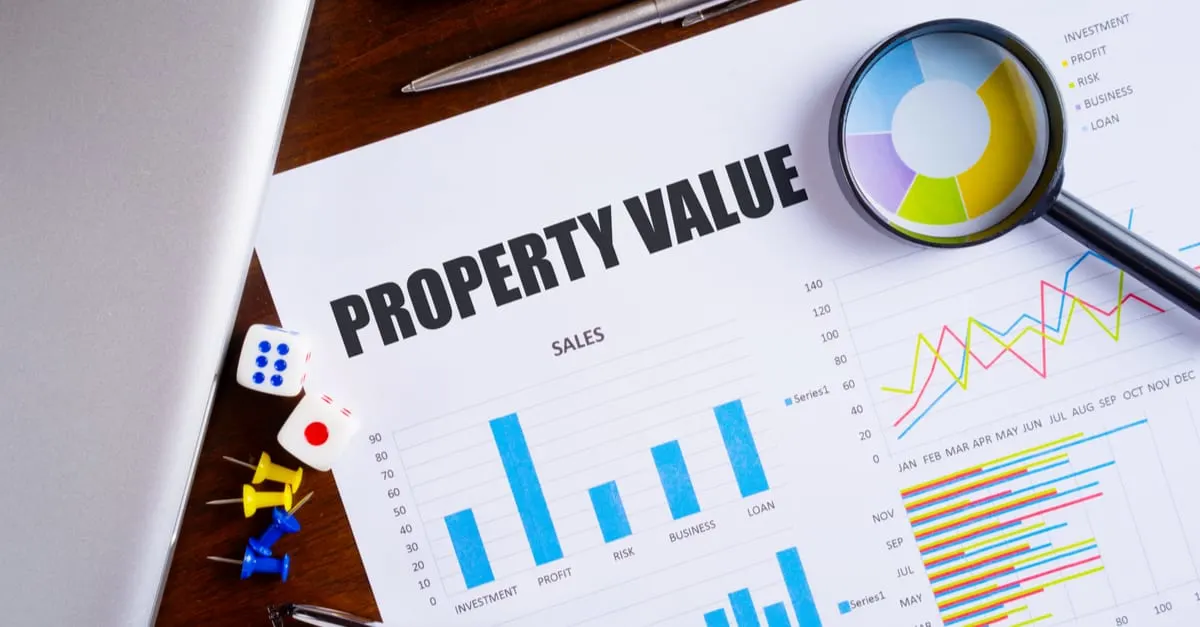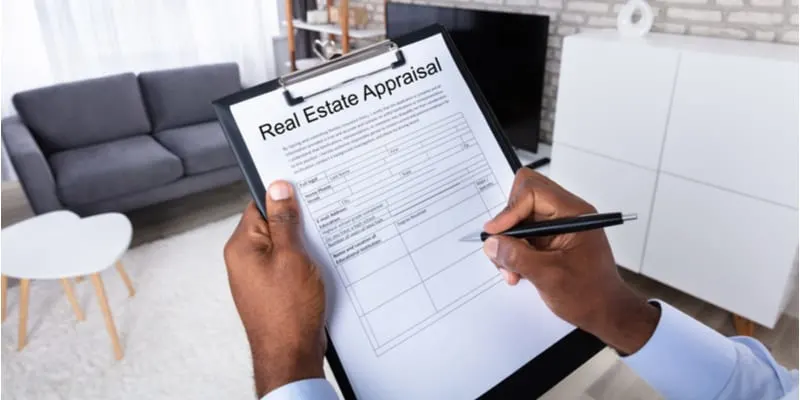Appraisers are at the center of every real estate transaction.
It’s their careful, unbiased calculations and assessments that determine how much a commercial or residential property is worth, how much cash a buyer can borrow, and how much the buyer will pay in property taxes.
If you’re seeking a real estate career that is fulfilling without relying on commissions, you might consider becoming a certified real estate appraiser.
We’ve made a step-by-step guide on how to become a real estate appraiser and what you can expect in a career as an appraiser, from salary to continuing education costs.
What Is a Real Estate Appraiser?
A real estate appraiser is responsible for determining the overall value of a property. They use several different methods and data sources to find out a property’s current worth. Their assessment is supremely important for a few reasons:
It determines how much the property can be sold for
- It informs the lender how much a buyer can borrow to purchase the property
- It shows the tax assessor how much the buyer will pay in property taxes
This role is one that requires research, critical thinking, and careful attention to detail. It is a hands-on career, and each day on the job brings something different.

Light and Dark Studio/Shutterstock
Appraisers are responsible for determining a property’s value by surveying residential or commercial properties, uncovering any relevant property records, and determining the value of surrounding properties to arrive at an appraisal starting point.
Then, they perform property-specific assessments to determine an exact value, taking all property amenities and issues into account. The job of an appraiser starts with a complete survey of the property. That includes:
- Visit a property (residential or commercial) and thoroughly assess the exterior
- Walk through the property room-by-room to evaluate the interior
- Make note of all amenities (things that increase the property’s value)
- Determine any issues, code violations, or problems
Once a complete property survey has been done, the appraiser will run comps (comparable property values) to get a bird’s-eye view of how the property being appraised compares with similar, nearby properties.
A property with the same amenities and features can have a vastly different value in different locations or even different areas within the same city.
Combining this information with experience helps the appraiser arrive at an exact property value, which is used to help a real estate transaction move forward.
How to Become an Real Estate Appraiser
Most states require you to start as an appraisal trainee (also called a registered appraiser or apprentice appraiser) before you can be a fully licensed appraiser.
Being an appraisal trainee helps you gather the experience you need in this field before going out on your own and being solely responsible for your assessments.
The Appraisal Qualifications Board (AQB) is the official overseer of all appraiser requirements and qualifications in every state. You’ll hear a lot about this organization in your training.
Your state’s requirements may be slightly different from those below, so be sure to check with your state’s regulatory agency for the most specific information.

Takayuki/Shutterstock
Appraiser Pre-licensing Education Courses
In general, appraisers have to complete the following pre-licensing courses, totaling 75 hours:
- Basic Appraisal Procedures: 30 hours
- Basic Appraisal Principles: 30 hours
- National Uniform Standards of Professional Appraisal Practice (USPAP): 15 hours
Appraisal Training
Once your pre-licensing courses are completed and passed, you’ll move on to supervised training under a licensed appraiser. This step is required to apply for the next license level. The appraiser licenses you can apply for are:
- Licensed Residential
- Certified Residential
- Certified General
You’ll need a college degree to get any of the Certified Appraiser licenses, but you do not need a degree to become a licensed residential appraiser (or appraiser trainee).
Here’s a look at the specific education requirements for each appraiser license level from McKissock Learning.
To apply for a Licensed Residential Appraiser license, you must complete additional courses and get 1,000 hours of “acceptable experience” over a minimum 6-month period. In some states, you may need more hours. Required courses include:
- Appraiser Site Valuation and Cost Approach: 15 hours
- Report Writing and Case Studies: 15 hours
- Market Analysis and Highest and Best Use: 15 hours
- Sales Comparison and Income Approaches: 30 hours
To apply for a Certified Residential Appraiser license, you’ll need 200 education hours in appraiser courses plus an Associate’s or Bachelor’s degree, 30 hours of completed college credit in specified topics, or a passing score on the CLEP exam in addition to 1,500 hours of acceptable experience over a minimum 12-month period (longer in some states).
To apply for a Certified General Appraiser license, you’ll need 300 appraiser education course hours, a minimum of a bachelor’s degree, and 3,000 hours of satisfactory experience over a minimum 18-month period, with at least 1,500 hours coming from commercial appraisal work under a supervisory appraiser.
You can find a supervisory-certified appraiser to help you get your required experience by:
- Ask your local real estate appraiser organization
- Check with your appraiser education organization
- Look for local, certified appraisers on LinkedIn
Once you’ve found a certified appraiser to train you, appraiser Harry Waters says you’ve already overcome the most significant challenge:
“The pre-licensing classes are easy, and the test is pretty easy. But finding someone to train you is very hard. The law here is that they are financially responsible for you for years, have to physically accompany you for months, and then they have to teach you basically everything because your pre-licensing class is very general.”
Once you’ve completed your state’s required education and experience hours as an appraiser trainee, you may be eligible to take the licensing exam and upgrade your license.
Speaking of that, we think the best way to get your appraisal license is to do it online. And McKissock Learning can help! Study from the comfort of your own home, on your schedule.
Upgrading Your Appraisal License
As long as you meet the education and experience requirements (as shown in the chart above), you can contact your local state advisory board to take the exam for the license you want to upgrade.
You can apply to upgrade your appraisal license to Licensed Residential, Certified Residential, or Certified General. Which license level should you seek?
Here are a few things to consider. Certified residential and certified general appraisers can become supervisory appraisers for trainees, but licensed residential appraisers are not.
Licensed residential appraisers have the fewest education and experience requirements, so the starting pay is lower (we’ll talk more about appraiser salaries below).
If you’re aiming to become a Certified Appraiser (Residential or General), you could start by upgrading to Licensed Residential and continue to upgrade as you gain the required education and experience hours.

Atstock Productions/Shutterstock
You could also upgrade directly from trainee to any license level for which you meet the requirements. Here’s a look at each license level and how they differ:
Licensed Residential Appraiser
- Non-complex 1-4 units (fewer than 5 individual dwellings within the property) with value under $1 million; Complex 1-4 units with value under $250,000
- Residential
Certified Residential Appraiser
- Any 1-4 residential unit, unlimited value
- Residential
Certified General Appraiser
- Any property has unlimited value
- Residential and commercial
Real Estate Appraiser Salaries
Appraisers at different license levels have different salaries. Let’s take a look at what you can expect to make each year at each appraiser’s license level. This salary data is from the Bureau of Labor Statistics and Salary.com.
- Overall Median Appraiser Salary: $54,980/year
- Certified Residential Appraiser Salary: $53,237/year
- Certified General Appraiser Salary: $101,422/year
Appraisers with more college education and higher-level degrees can make higher salaries, as can appraisers in areas with higher average wages.
For example, appraisers in San Francisco, California, make an average of 25.3% more than the national average salary. In contrast, appraisers in Miami, Florida, make an average of 2.7% less than the national average salary.
- The lowest-paid residential appraisers (bottom 10%) make $36,055/year on average, while the highest-paid residential appraisers (top 10%) make $70,431/year on average.
- The lowest-paid general appraisers (bottom 10%) make $74,311/year on average, while the highest-paid general appraisers (top 10%) make $129,929/year on average.
Appraiser Continuing Education
Even after you obtain your appraiser license and start making a salary, you’re never quite finished with your training and education. All states require continuing education (CE) courses for anyone holding an appraiser license.
These courses serve to keep appraisers up-to-date on industry developments and changing standards. Every state’s requirements are different, but here are the requirements for California and Texas as an example.
California Appraiser CE Requirements
- 56-course hours every four years
- National USPAP course: 14 hours (taken twice over the four years)
- California Law: 4 hours
Texas Appraiser CE Requirements
- 28-course hours every two years
- National USPAP course: 7 hours
- Elective courses: 21 hours
Real Estate Appraisal Education Cost
McKissock Learning is the top-rated distance-learning school for real estate appraisal courses. Every state’s differing education hours and CE course hour requirements mean the cost varies by state.

Watchara Ritjan/Shutterstock
Still, we’ll again use California and Texas as examples to give you an idea of how much it costs to get your required education hours to become a real estate appraiser.
- California Appraisal Licensing Education: $1,299.00 to $2,199.95
- California Appraisal CE Courses (every 4 years): $809.99
- Texas Appraisal Licensing Education: $899.95 to $1,299.00
- Texas Appraisal CE Courses (every two years): $519.99
In many cases, your employer will cover the cost of your continuing education courses. If you’re working for yourself, you can write off the cost of your continuing education courses (and your licensing education) on your taxes.
Is Real Estate Appraisal the Career for You?
We’ve covered the basics of the job, the education it requires, how to gain your “accepted experience” as an appraiser trainee, and the different licensing levels.
We’ve looked at the types of properties each license level can appraise and the average salary for an appraiser at different license levels. You also know the general cost of real estate appraisal education and the continuing education requirements.
You might be prepared to take the first step and look into your state’s particular course requirements if you’re interested in the idea of becoming a real estate appraiser and believe you have strong analytical abilities.
We recommend McKissock Learning; they have the most accurate state requirement information directly on the website, and you can see exactly how much your courses will cost.

